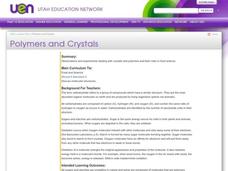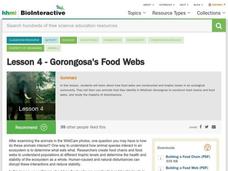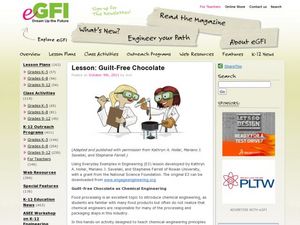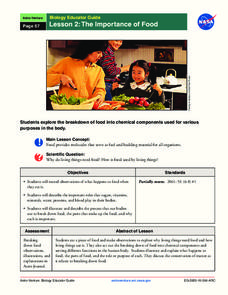Curated OER
Food Science, Scientific Method: Reliability and Validity in Empirical Research
Secondary learners explore food science by conducting an experiment using the scientific method and creating a science fair project based on their findings. They learn about food technology and modern research development. They...
Mascil Project
Molecular Gastronomy - Science in the Kitchen
Some say cooking is an art—and a science! Scholars scope out the savory subject of molecular gastronomy with a series of related activities. The teacher's guide contains printable worksheets and helpful tips for implementing the lesson.
Baylor College
What's That Food?
Get things cooking with the first lesson plan in this series on the science of food. Working in small groups, young scientists make and record observations about different mystery foods. These descriptions are then shared with the class...
Curated OER
Polymers and Crystals: Their Role in Food Science
Blend chemistry with cooking in this exploration of polymers, carbohydrates, and food science. Experimenting with gelatin produces concrete examples of the bonding and ploymerization discussed in the lesson plan. Copious, comprehensive...
University of Georgia
Energy Content of Foods
Why do athletes load up on carbohydrates the evening before a competition? The lesson plan helps answer this question as it relates the type of food to the amount of energy it contains. After a discussion, scholars perform an experiment...
Virginia Department of Education
Freshwater Food Chains
What's in the water? Encourage your class to further explore this question and learn about pond ecosystems, food chains, and food webs as they complete this hands-on activity. They view the environment from a new perspective after...
Curated OER
Fast Fats: A Nutritional Analysis of America's Obsession with Fast Foods
How do you read a nutritional label? Help high schoolers practice reading nutritional labels on foods so they can calculate the calories in different types of foods. They will also examine the effects of fat on the body and the link to...
Howard Hughes Medical Institute
Lesson 4: Gorongosa's Food Webs
Who eats who in the savannas of Africa? Explore trophic levels with part four of an eight-part series of lessons focused around Gorongosa National Park. After young explorers identify animals using trailcam images, they construct a food...
Curated OER
Food for Spaceflight
When astronauts get hungry in outer space, they can't just call and have a pizza delivered. In order to gain an appreciation for the challenges associated with space travel, young learners are given the task of selecting, testing, and...
Baylor College
Food Webs
Explore various ecosystems from around the world as your class discovers the interdependence of all living things. Using the provided sets of ecosystem cards, young scientists work in small groups building food webs to demonstrate the...
Baylor College
Using Food Labels
Help your class make sense of nutrition labels with the ninth lesson of this series. After explaining the different information provided on packaged food labels, perform an activity that demonstrates the amount of sugar in a single can...
Baylor College
Food for Kids
Immediately capture the attention of your class with the smell of freshly popped popcorn in the sixth lesson of this series on the needs of living things. Young scientists first use their senses to make and record observations of...
Consortium for Ocean Science Exploration and Engagement (COSEE)
Plankton to Penguins: Antarctic Food Web
A well-written lesson plan, second in a series of four, gets high schoolers exploring how the Antarctic food web is impacted by climate change and the associated melting of polar ice sheets. It begins with a PowerPoint presentation about...
Towson University
The Crucial Concentration
Which sports drink provides the best pick-me-up after the big game or grueling workout? It may not be the one you'd think! Food science is the focus in a surprising lab activity. Pupils use colorimetry to determine the amount of protein,...
Curated OER
Summer Science Recipes: Experiments on the Grill and in the Kitchen
Generate ideas about the most scientifically sound ways to prepare foods safely and efficiently during the summer season. Learners will use the GED Connection Science Workbook, so they can practice the skills needed to prepare for the...
Baylor College
Healthy Snacks
Assess your pupils' ability to identify healthy food choices in the final instructional activity of this series on food science. Given five different food labels, young nutritionists will rank them from most to least healthy, supporting...
Curated OER
Food Preservation: Food Science, Canning, Gardening
Learners consider the procedures and safety issues involved in food preservation. They conduct experiments in canning, freezing and drying. If everyone can preserve food utilizing a variety of methods and science principles, the...
Curated OER
Discovering Local Food Chains
Fourth graders study about food chains. With the assistance of a local biologist, Students hike the school trail system. They explore ecosystem and collect data by charting the organisms found and identifying the energy source. They...
Curated OER
Lesson: Guilt-Free Chocolate
Experiment with chocolate coating on cookies! What a delightful way to learn about food processing and chemical engineering. Throughout this activity, groups collect measurements and make calculations. They conclude by writing...
NASA
The Importance of Food
Pupils make observations while eating food. They act out the process of food breaking down in the body and the roles of various chemical components, such as sugar and protein. It concludes with an activity illustrating the process and a...
World Wildlife Fund
Arctic Food Chain
Explore the food chains that support Arctic ecosystems. A class discussion on interdependence and the different roles plants and animals play in ecosystems provides young scholars with the knowledge to complete a worksheet asking them to...
Serendip
Food Webs, Energy Flow, Carbon Cycle, and Trophic Pyramids
The reintroduction of a species to an area doesn't always go as expected. Scholars learn about the reintroduction of wolves into Yellowstone National Park with a video, reading, and discussion questions. They complete a hands-on activity...
NOAA
Understanding Food Chains and Food Webs
Jump into an exploration of marine ecosystems with the first lesson in this four-part series. After first learning about crustaceans, mollusks, and other forms of sea life, young marine biologists view a PowerPoint presentation that...
Chymist
The Extraction and Identification of Artificial Food Colors
Did you know some food dyes are considered safe while others are considered carcinogenic? During the experiment, young chemists extract artificial food colors from prepared foods. Then, they use chromatography paper to identify which...
Other popular searches
- Science Project Food
- Science Animal Food Chain
- Food Science Experiments
- Food Science Vocabulary
- Food Science Careers
- Consumer Science Food
- Spanish Food Science
- Simple Food Science
- Food Science Service Project
- Food Science Nutrition
- Nutrition and Food Science
- Food Science Lesson Plan

























